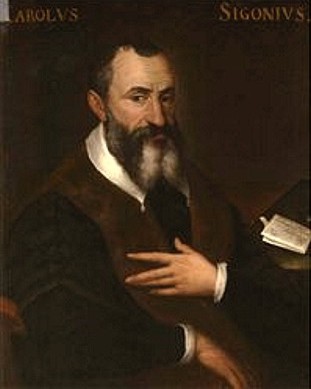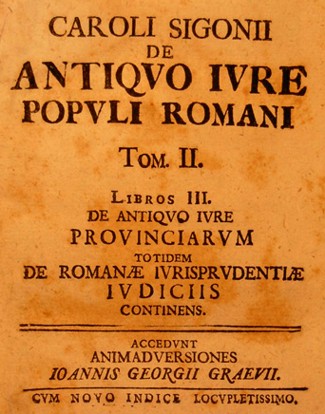Lessico
Carlo Sigonio

Storico e filologo classico nato a Modena intorno al 1520 e morto a Ponte Basso (Modena) nel 1584. Dopo gli studi compiuti nelle università di Bologna e Pavia fu per qualche tempo al servizio del cardinale Marino Grimani a Modena, quindi professore di greco a Modena (1546), di letteratura a Venezia (1552), Padova (1560), Bologna (1563).
Scrisse numerose opere storiche, tutte in latino, fra l'altro piuttosto significative per la scrupolosità nell'utilizzazione delle fonti e l'attenzione prestata al Medioevo. Oltre agli studi filologici sull'antichità (Regum, consulum, dictatorum ac censorum Romanorum Fasti, A. Gadaldini, Modena 1550; De antiquo iure civium romanorum libri duo, Giordano Ziletti, Venezia 1560), rimarchevole è Historiarum de regno Italiae ab anno 570 ad annum 1200 libri XX, che espone i principali eventi italiani dal 570 al 1200 e che è tra i primi tentativi di superare la concezione umanistica del Medioevo come età di barbarie.
Nel 1568 fu nominato
storiografo cittadino dal Senato di Bologna, che lo incaricò di redigere
un'opera storica, le Historiae Bononienses ab initio civitatis usque ad
annum MCCLVII (Bologna 1578), che costituisce un primo rilevante tentativo
di storia locale e regionale. Al centro delle Historiae de Occidentali
Imperio (Bologna, 1578), in venti libri, è il periodo compreso tra
l'impero di Diocleziano (iniziato nel 284) e la discesa dei Longobardi (565).
Per incarico di papa Gregorio XIII![]() scrisse, infine, le Historiae
ecclesiasticae, rimaste incompiute e pubblicate solo nel 1734.
scrisse, infine, le Historiae
ecclesiasticae, rimaste incompiute e pubblicate solo nel 1734.
www.international.rai.it

Carolus Sigonius (Carlo Sigonio or Sigone) (c. 1524 - 1584) was an Italian humanist, born in Modena. Having studied Greek under the learned Franciscus Portus of Candia, he attended the philosophical schools of Bologna and Pavia, and in 1545 was elected professor of Greek in his native place in succession to Portus. In 1552 he was appointed to a professorship at Venice, which he exchanged for the chair of eloquence at Padua in 1560.
To this period of his life belongs the famous quarrel with Francesco Robertelli (Udine 1516 - Padova 1567), due to the publication by Sigonius of a treatise De nominibus Romanorum, in which he corrected several errors in a work of Robertelli on the same subject. The quarrel was patched up by the intervention of Cardinal Seripando (who purposely stopped on his way to the Council of Trent), but broke out again in 1562, when the two rivals found themselves colleagues at Padua. Sigonius, who was of a peaceful disposition, thereupon accepted (in 1563) a call to Bologna. He died in a country house purchased by him in the neighbourhood of Modena, in August 1584. The last year of his life was embittered by another literary dispute.
In 1583 there was published at Venice what purported to be Cicero's Consolatio, written as a distraction from his grief at the death of his daughter Tullia. Sigonius declared that, if not genuine, it was at least worthy of Cicero; those who held the opposite view (Antonio Riccoboni, Justus Lipsius, and others) asserted that Sigonius himself had written it with the object of deceiving the learned world, a charge which he explicitly denied. The work is now universally regarded as a forgery, whoever may have been the author of it.
Sigonius's reputation chiefly rests upon his publications on Greek and Roman antiquities, which may even now be consulted with advantage:
Fasti consulares (1550; new ed., Oxford, 1802), with commentary, from the regal period to Tiberius, the first work in which the history of Rome was set forth in chronological order, based upon some fragments of old bronze tablets dug up in 1547 on the site of the old Forum
An edition of Livy with the Scholia
De antiquo jure Romanorum, Italiae, provinciarum (1560) and De Romanae jurisprudentiae judiciis (1574)
De republica Atheniensium (1564) and De Atheniensium et Lacedaemoniorum temporibus (1565), the first well-arranged account of the constitution, history, and chronology of Athens and Sparta, with which may be mentioned a similar work on the religious, political, and military system of the Jews (De republica Ebraeorum). His history of the kingdom of Italy (De regno Italiae, 1580) from the invasion of the Lombards (568) to the end of the 13th century forms a companion volume to the history of the western empire (De occidentali imperio, 1579) from Diocletian to its destruction.
In order to obtain material for these works, Sigonius consulted all the archives and family chronicles of Italy, and the public and private libraries, and the autograph manuscript of his De regno Italiae, containing all the preliminary studies and many documents not used in print, was discovered in the Ambrosian library of Milan.
At the request of Pope Gregory XIII he undertook to write the history of the Christian Church, but did not live to complete the work. The most complete edition of his works is that by P Argelati (Milan, 1732-1737), which contains his life by L.A. Muratori, the only trustworthy authority for the biographer.